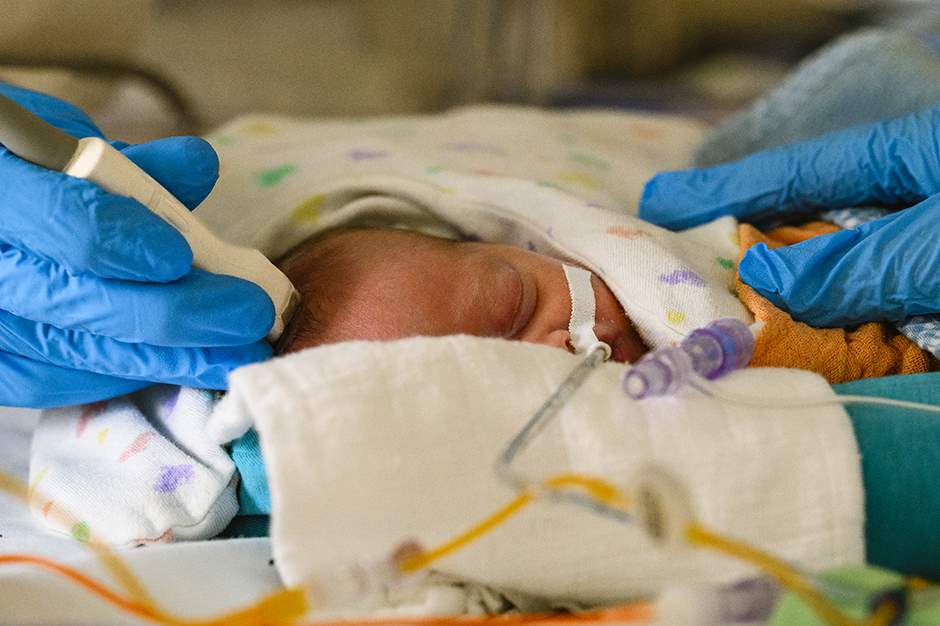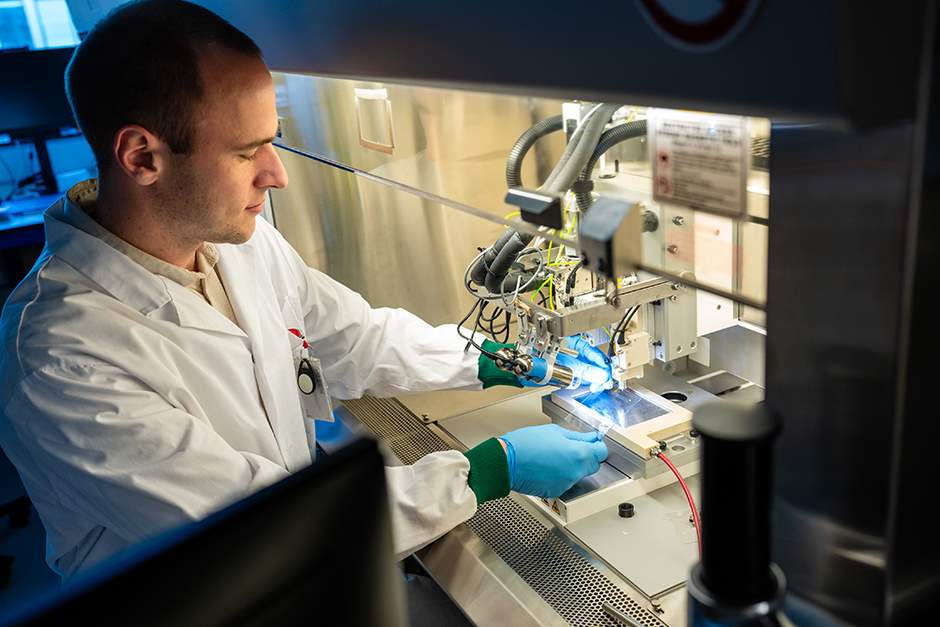Unique research
We have divided our research into six substantial programs (focal points) . Some examples of unique, trailblazing research in 2023 are:
Active sleep ensures the best possible for premature babies
Researchers at UMC Utrecht have studied the role of sleep on the brain development of premature babies . In 2023 they found a link between more more active sleep and better development of white matter in their brains. White matter is essential for processing information and connecting different areas of the brain, which in turn is vital for cognitive and motor functions. Based on this discovery, the research team in future wants to keep a closer eye on the sleep of premature babies in pediatric IC. Medical interventions can then, insofar as possible, be done at times when the baby is not in an active sleep phase. This will give premature babies the best possible start in life. On March 7, 2023 the Sleep Discovery Lab was also officially launched.

Artificial intelligence improves cancer treatment
In the Netherlands, tumors are detected in the brains or spinal cords of some 1,400 adults and 150 children each year. Previously, the type of brain tumor and how aggressive it was, could only be determined one week after its surgical removal, once the removed tissue had been analyzed. In 2023 researchers from UMC Utrecht, Princess Máxima Center, and Amsterdam UMC made successful use of artificial-intelligence (AI) technology to determine the type of tumor during surgery already, within an hour and a half. Through this new technique the neurosurgeon can, if necessary, already adapt the operation plan for children while the operation is still under way. This often eliminates the need for a second operation. Princess Máxima Center has judged that the results of this technique are sufficiently reliable and is are now using it in practice with children for whom the outcome may be determining for the operation plan.
AI also helps to screen breast cancer more effectively. Women with very dense breast tissue are more likely to develop breast cancer. With the help of AI, researchers at UMC Utrecht have now found a factor that could be an additional indicator of the development of cancer in this group of women: the extent to which normal gland and connective tissue shows up through contrast medium in an MRI. This outcome could eventually help to perform additional MRI screening in very dense breast tissue more effectively.
Vaccinating against RS virus now possible
Every year, 150 to 200 babies in the Netherlands with an RS-virus infection are taken up in intensive care. Worldwide, RSV is the second largest cause of death among infants, after malaria. From three studies in which UMC Utrecht was involved, it appeared in 2023 that it was becoming possible to vaccinate babies, pregnant women, and older people. This can prevent serious infection due to the RS virus. The new vaccines present a turning point in the fight against RSV.
Increasing the efficiency of treatment for heart failure
Both with healthy and sick people the so-called 24-hour rhythm is important for the functioning of the body. Researchers at UMC Utrecht had been asking themselves whether the 24-hour rhythm might alter in patients with heart failure , a condition that some 250,000 people in the Netherlands suffer from. They discovered in 2023 that, despite disturbances in hormone levels and bodily functions, the molecular clock in the heart remains intact and that a 24-hour rhythm is still present. If we keep this in mind for instance when scheduling operations or administering drugs, we can thereby improve the effectiveness of a treatment.
Patients with kidney failure 23% less risk of dying
Kidney failure frequently occurs as a chronic, non-transmittable disease. Over 6,200 patients in the Netherlands, and about 4 million worldwide, undergo dialysis treatment. Research led by UMC Utrecht showed in 2023 that a new dialysis method, hemodiafiltration, is a better treatment for patients with kidney failure than hemodialysis. This new dialysis treatment reduces by 23% the risk of death among patients with kidney failure. An important breakthrough in the treatment of patients with kidney failure. This is expected to lead to a more widespread use of hemodiafiltration around the world.
Two new types of bacteria discovered in patients with bowel inflamation
In 2023, researchers from UMC Utrecht and Yale University (USA) discovered two new types of bacteria in patients with an inflammatory bowel disease (IBD) . IBD is a chronic inflammatory condition that mainly consists of Crohn disease and colitis ulcerosa, and that affects millions of people worldwide. An in-depth characterization of the two new types of bacteria has shown that these are responsible for breaking down the protective mucous layer of the bowel wall which in turn causes strong immune reactions. These findings emphasize the potential role of bacteria in the disease course of IBD and might contribute to new treatments in the future.
Bioprinting to replace tissue and organs in the future
For years already there has been a shortage of suitable donors. In 2023, various steps were taken at UMC Utrecht to eventually be able to produce replacement tissue and organs through bioprinting. A chemical ‘map’ could for instance be made for cells from which tissue and organs can be built up. A PhD student also developed a granular gel that helps to place cells in a very precise and controlled way during bioprinting. This granular gel also allows more biological activity in the printed tissue or organ. Stem cells can thus spread more, create epithelial cells with more connections, and enable neurons to connect with each other.Lastly, researchers developed a very precise method of 3D printing whereby a blood vessel can be made , a complex structure that must be mechanically strong and powerful.
